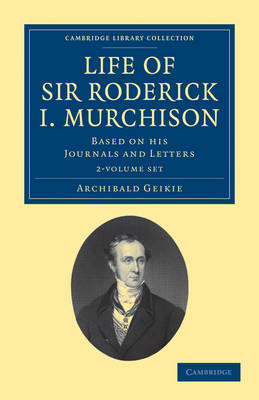Cambridge Library Collection - Earth Science
3 total works
Sir Andrew Crombie Ramsay (1814-91) was a British geologist with a particular interest in the effects of glaciation on the landscape. He travelled in Europe and America, and was a keen climber. His first work, Geology of the Island of Arran (1840), also published in this series, attracted the attention of Roderick Murchison, who found him employment with the Geological Survey, and Ramsay later succeeded Murchison as its director. He carried out important fieldwork in Wales, taught at University College London and the Royal School of Mines, and published a successful textbook. Another major contribution was his work on the origin of lakes: his controversial 1862 proposal that glaciers could hollow out lake basins even in the absence of earth movements was eventually accepted. Ramsay's younger colleague at the Geological Survey, Sir Archibald Geikie (1835-1924), who also wrote a biography of Murchison, published this memoir in 1895.
Despite never graduating from university, Sir Archibald Geikie (1835–1924) forged an exceptionally successful scientific career. In 1855 he was appointed to the Scottish branch of the Geological Survey, and by 1882 was Director General of the Survey. In keeping with his Edinburgh beginnings, most of his career was spent studying igneous rocks. He was a prolific and gifted writer, producing textbooks, popular science books and biographical and historical works, including the influential Founders of Geology (1897), as well as numerous technical publications. The only geologist to hold the post of President of The Royal Society (1908–12), he also served as President of the Geological Society of London and the British Association, and received an array of honorary degrees and medals. This autobiography, published in the year of his death, provides a readable, personal account of the life of one of the great scientific figures of the nineteenth century.
Sir Roderick Impey Murchison (1792-1871) was an influential Scottish geologist best known for his classification of Palaeozoic rocks into the Silurian system. After early military experience in the Peninsular War, he resigned his commission; a chance meeting with Sir Humphrey Davy led him subsequently to pursue a scientific career. The Silurian System, published in 1839, was a highly influential study, which established the oldest contemporary classification of fossil-bearing strata. Murchison was appointed President of the Royal Geographical Society in 1843. These volumes, first published in 1875, use information taken from Murchison's private journals and correspondence. Archibald Geikie (1835-1924) provides a detailed account of his mentor's life and work in the context of geology as a developing science in the early nineteenth century, and provides a fascinating insight into the life and work of this eminent Victorian geologist.


